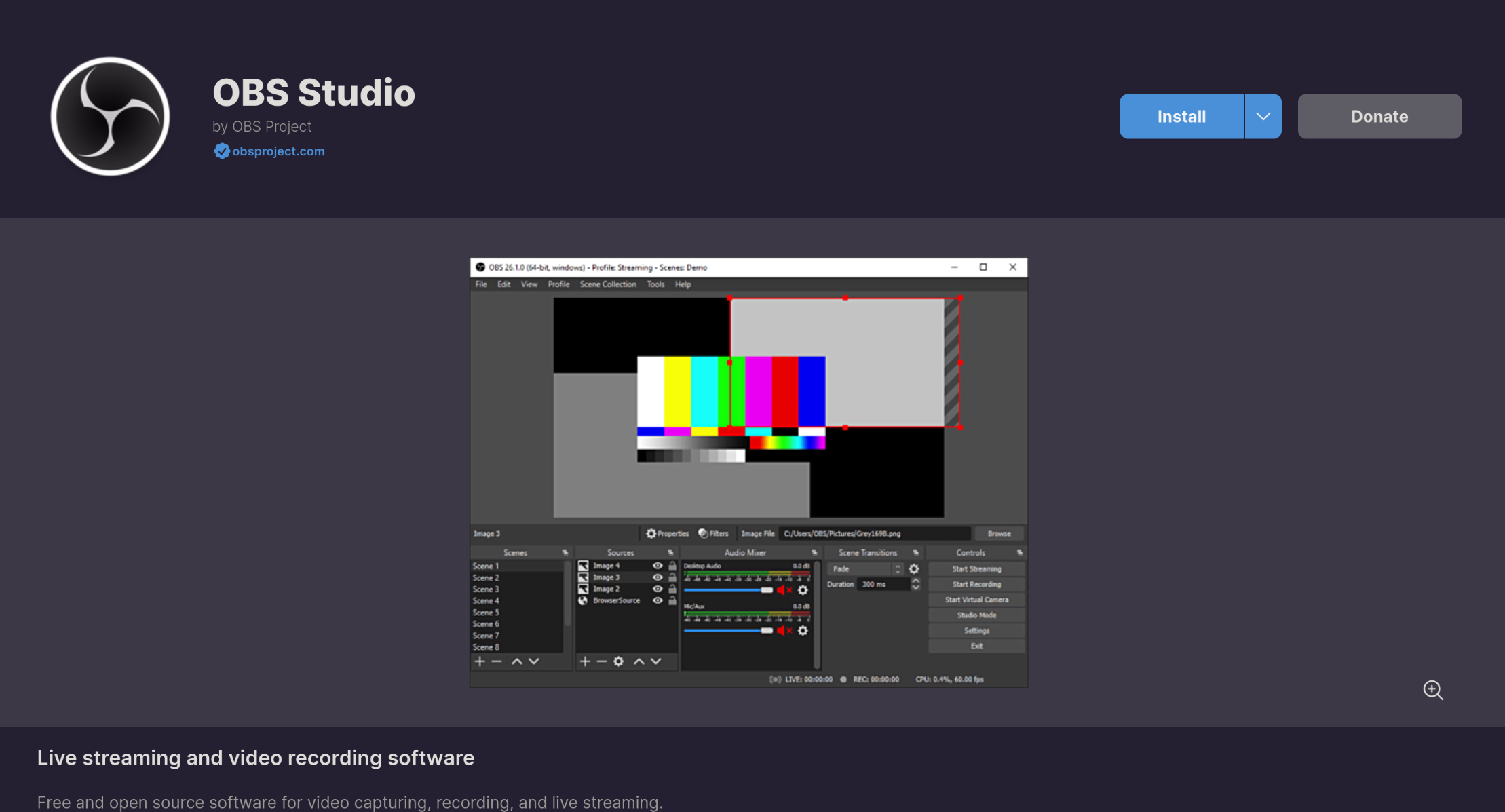Today, OBS Studio published its 27.2 release. With this release, besides the always good to have bugfixes and improvements, there’s one change in particular that makes me super excited: this is the first release officially published to Flathub!
Flathub joins OBS Studio’s Ubuntu PPA in the list of official builds.
On Ubuntu, both can be installed and used without any major annoyance, since Flatpak can easily be installed there – though it would be great if Flatpak was distributed by default on Ubuntu, but oh well, such is life. For other Linux distributions, especially the ones not based on Debian, the Flathub package is probably the easiest one to install, and certainly the most complete.
Official Build
Becoming an official build is not only a badge, or a community recommendation, in OBS Studio’s case. It brings features only enabled in official builds.
The first and most obvious one is services integration. OBS Studio builds its Flatpak package on its own CI, and enables this feature using private keys that aren’t otherwise available to distribution packages. This build is then published on Flathub directly. ¹
Another benefit is that the OBS Studio community can effectively enable and support a lot more Linux users to use it the way the community envisioned. People on Fedora, Arch, Gentoo, Endless OS, Debian, elementary OS, and dozens of other distros can use a complete, featureful, and supported build of OBS Studio. In many cases, these distros come with Flatpak and even Flathub by default, and OBS Studio can be installed with a simple search in their app centers. It couldn’t possibly be easier than that.
Wild Packaging
In addition to enabling services integration, Flatpak makes it much easier for OBS Studio to package its complicated dependencies. For example, OBS Studio needs to patch CEF internally for it to be used as the browser source, and browser docks, and this makes it pretty difficult to package it using traditional packages, since it could conflict with the upstream CEF package. FFmpeg is another case of a patched dependency.
Unfortunately, many distro packages don’t ship with browser integration, and don’t use the patched FFmpeg. Perhaps even worse, some unofficial packages add many third-party unofficial plugins by default. This vast array of packaging formats enabling different features, and shipping different plugins, make it much harder for the support volunteers to support Linux users properly.
Speaking for myself, even when people were using the Flathub package before it was made official, the fact that it was a Flatpak made it significantly easier to track down bugs. And, interestingly, it made it much easier to track down bug in other packages, such as distros mispackaging or not installing all portal dependencies correctly. In some sense, Flatpak may have helped distributions package dependencies better! 🙂
Plugin Support
Plugins are the heart and soul of OBS Studio. People use a variety of third-party plugins, and supporting them is important for a complete experience.
Flatpak has support for extensions, which are used to audio plugins for example. OBS Studio is able to detect plugins installed via Flatpak. ²
The number of OBS Studio plugins available on Flathub is numerically small, but their packaging is robust and they’re well supported. I’m confident in these plugins – many of which are maintained by their own authors! – and I’m hopeful that we’ll see more of them showing up there in the future.
If you are a plugin author that wants your plugin to show up on app stores like the screenshot above, I’ve written some documentation on the process. It should be relatively easy to do that, but if you have any questions about it, please let me know. I’d like to make this as well documented and simple as possible, so that we can focus less on technicalities, and more on the quality of the packaging and metadata. The Flatpak community is also welcoming and willing to help everyone, so feel free to join their Matrix room.
Conclusion
It is super exciting to me that OBS Studio is being published on Flathub officially. I think it makes it so much more convenient to install on Linux! I’m also looking forward the recent work on introducing payments and official badges on Flathub, and will make sure that OBS Studio gains such badge as soon as it’s available.
Other than these Flatpak-related news, there are more PipeWire changed in the pipeline for future OBS Studio releases, and some of these changes can be really exciting too! Stay tuned as we progress on the PipeWire front, I’m sure it will enable so many interesting features.
As I write this article, I’m starting to feel like the dream of an actual Linux platform is slowly materializing, right here, in front of us. OBS Studio is spearheading this front, and helping us find what the platform is still missing for wider adoption, but the platform is real now. It’s tangible, apps can target it.
I’d like to thank all the contributors that made this possible, and in particular, tytan652 and columbarius. Nothing I wrote about here would have been possible without your contributions. I’d like to also thank Flathub admins for helping figuring out the publish pipeline. Finally, I’d like to thank the OBS Studio community for accepting these contributions, and for all the patience while we figured things out.
¹ – Massive thanks to tytan652 for implementing secret keys support in flatpak-builder
² – If a plugin is not available on Flathub, you can still manually install them. This is dangerous though, and can make OBS Studio crash. If you want to see a plugin on Flathub, it is always best to politely suggest that for the author!



Leave a Reply